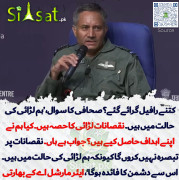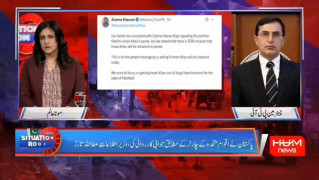sagaciouscorpion
MPA (400+ posts)
The Other View: Winds of War - Israel and Lebanon
Ziad Khalil Abu Zayyad
The Israeli government has recently threatened that should Hizbullah join Beirut's incoming
government, it would respond to any attack launched by Hizbullah by targeting Lebanon itself. Israel
stated that if Hizbullah attacked any Israeli anywhere it was prepared to attack targets on Lebanese soil.
Hizbullah officials stated in response that the organization was even stronger today than at the
beginning of the Second Lebanon War in 2006, and that its armed wing was well prepared for any
possible confrontation with Israel. The officials also stated that Israel would not dare start a new war with
Lebanon since the United States would not support such a move at the current time.
Israeli Prime Minister Binyamin Netanyahu has stated that there are no "winds of war" blowing in the
north, only a war of words and media. However, Israeli troop movements and training exercises on
the northern border seem to tell a different story. In reaction, the Lebanese army has moved some of its
forces south.
Although both sides claim that there are no winds of war in the north, they seem to be acting just as they
did before the 2006 war. Both continue to prepare for the next battle while claiming that nothing serious
is going on.
Hizbullah has not yet reacted to the death of Imad Mugniyeh, for which it blames Israel, but continues to
state that it is its right to take revenge at any time and place for the assassination of one of its important
leaders. The equation is further complicated by Hizbullah's ties to Iran. Neither will take
action without deliberation and complete cooperation.
Israel seems to be waiting for Hizbullah to make one wrong step so it can launch a new war and release
the pressure the new American administration has been putting on it. Another war would also serve to
bolster Israeli deterrence in the region.
The Second Lebanon War was launched by then-Israeli prime minister Ehud Olmert in response to
the kidnapping of three Israeli soldiers by Hizbullah. According to Hizbullah, the kidnapping was aimed
at securing the release of Lebanese prisoners held for years by Israel.
The sensitivity of the situation is also increased due to the Iranian threat, which Israel wants to put an
end to as soon as possible. According to several reports, Israel requested a green light from the White
House to launch an attack against Iranian targets while the Islamic Republic was preoccupied
with demonstrations and internal conflict over the controversial re-election of President Mahmoud
Ahmadinejad.
As neither side wants to launch an unprovoked attack, they are each waiting for the other to make a
misstep so a new round of fighting can begin.
When writing about the Middle East, one can always be sure of being proved right in predicting war. The
question is always when, not if. This is because parties in the region are more interested in
launching wars in than finding a diplomatic solution.
Source: Jerusalem post...
Ziad Khalil Abu Zayyad
The Israeli government has recently threatened that should Hizbullah join Beirut's incoming
government, it would respond to any attack launched by Hizbullah by targeting Lebanon itself. Israel
stated that if Hizbullah attacked any Israeli anywhere it was prepared to attack targets on Lebanese soil.
Hizbullah officials stated in response that the organization was even stronger today than at the
beginning of the Second Lebanon War in 2006, and that its armed wing was well prepared for any
possible confrontation with Israel. The officials also stated that Israel would not dare start a new war with
Lebanon since the United States would not support such a move at the current time.
Israeli Prime Minister Binyamin Netanyahu has stated that there are no "winds of war" blowing in the
north, only a war of words and media. However, Israeli troop movements and training exercises on
the northern border seem to tell a different story. In reaction, the Lebanese army has moved some of its
forces south.
Although both sides claim that there are no winds of war in the north, they seem to be acting just as they
did before the 2006 war. Both continue to prepare for the next battle while claiming that nothing serious
is going on.
Hizbullah has not yet reacted to the death of Imad Mugniyeh, for which it blames Israel, but continues to
state that it is its right to take revenge at any time and place for the assassination of one of its important
leaders. The equation is further complicated by Hizbullah's ties to Iran. Neither will take
action without deliberation and complete cooperation.
Israel seems to be waiting for Hizbullah to make one wrong step so it can launch a new war and release
the pressure the new American administration has been putting on it. Another war would also serve to
bolster Israeli deterrence in the region.
The Second Lebanon War was launched by then-Israeli prime minister Ehud Olmert in response to
the kidnapping of three Israeli soldiers by Hizbullah. According to Hizbullah, the kidnapping was aimed
at securing the release of Lebanese prisoners held for years by Israel.
The sensitivity of the situation is also increased due to the Iranian threat, which Israel wants to put an
end to as soon as possible. According to several reports, Israel requested a green light from the White
House to launch an attack against Iranian targets while the Islamic Republic was preoccupied
with demonstrations and internal conflict over the controversial re-election of President Mahmoud
Ahmadinejad.
As neither side wants to launch an unprovoked attack, they are each waiting for the other to make a
misstep so a new round of fighting can begin.
When writing about the Middle East, one can always be sure of being proved right in predicting war. The
question is always when, not if. This is because parties in the region are more interested in
launching wars in than finding a diplomatic solution.
Source: Jerusalem post...




























